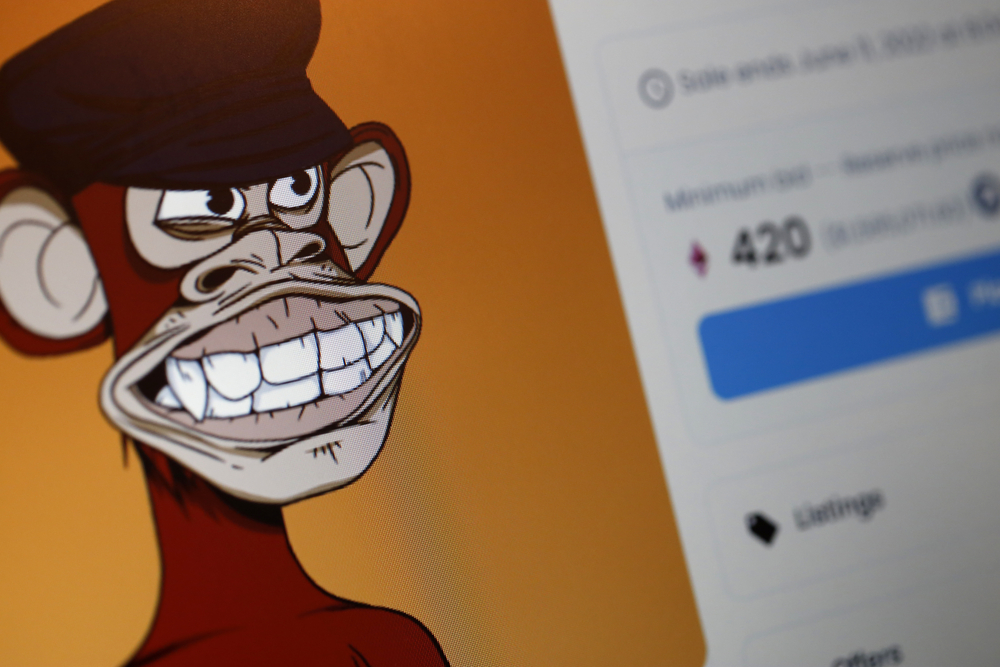Usually, when something regarding the iconic Bored Apes Yacht Club NFT collection hits the headlines it has to do with big-buck sales or celebrity investors. Well, not this week. Instead, BAYC is making news or a different kind- a rare token selling for more than 99% below its estimated value.
Yes- you read that right. Earlier this week, a highly collectible and sought-after token from the Bored Apes Yacht collection sold for a measly 200 USDC- a mere 0.09% of the floor price. The most shocking part is that it is not a singular event.

What people are now questioning is whether the obscenely low selling price was some kind of major error or a calculated move by the buyer or seller- or both.
A Bored Ape for $200??
Bored Apes Yacht Club is one of the best-known and most valuable NFT collections. Beloved by the rich and famous, BAYC tokens have become something of a status symbol. The standard floor price is an impressive $206,000 (101.75 ETH), but many go for much more.
It is no surprise then that when one sells for just $200, more than a few eyebrows are raised. That is exactly what happened to BAYC #6462. What makes the sale even more confusing is that this particular token has some rare attributes, which would normally mean a selling price that is much higher than the floor estimation.
In this case, the Bored Ape is sporting a bone necklace and a helmet- not to mention the pizza slice hanging out its mouth. It has a rarity score of 152.31, securing it a rank of 1031 out of 10,000. That sort of score could be expected to bring close to 200 ETH (more than $396,000), not $200!
Why the Sale Is Suspicious
Aside from the obvious (meaning the incredible difference between the value and sale price), something is not quite right about this sale. Of course, there is always the possibility that it is just one very costly mistake from the seller’s side- perhaps mistaking $200 for 200 ETH.
However, a few things about this transaction have some eagle-eyed NFT fans questioning just how accidental it was.
First of all, the token’s trade history is certainly of note. Since it was minted, the NFT has passed between five different wallets. That, in itself, is not out of the ordinary, but the latest on the trades is.
The final trade went to an account that was very new. In fact, the wallet was completely empty before the purchase. Again, this is far from solid evidence of wrongdoing, but it is odd for a new collector to snap up a BAYC in such a dramatic fashion. The seller’s account also comes with an empty wallet, which is another red flag.
To make things even more suspicious, the bid of $200 USDC was accepted within minutes of the NFT launching for sale. In most cases, sellers choose to wait as long as possible to get the most out of the bidding and hopefully drive up the price. Exactly three minutes after posting BAYC #6462, the seller accepted the laughable bid.
What does that mean? Some say it could be some extreme take on mate’s rates- possibly a seller who doesn’t need the money selling it on the cheap to a friend or relative. It could also be a hack, although there is no evidence to back up that theory.
Unfortunately, another likely reason is tax evasion. Amidst the dwindling empathy for the poor seller of BAYC #6462, more and more tweets claim the sale is a classic example of an NFT tax cheat. The only person who really knows is the seller.
Previous Questionable Bored Ape Sales
The BACY #6462 story is not a solitary tale. In another apparent error, Ape #3457 sold last year for $3000 instead of the intended $300,000. There are other examples of tokens going for more than 90% below their expected value, but these two Apes are arguably the most headline-worthy.
Final Thoughts
Incidents like this draw out a dark side to NFTs and get the conversation started about the people who use the market for questionable purposes. The BAYC #6462 mystery is sure to bring up a lot of opinions.
Whatever happened- be it an honest but painful error or something a little shadier- the sale will go down in the history books for all the wrong reasons.

